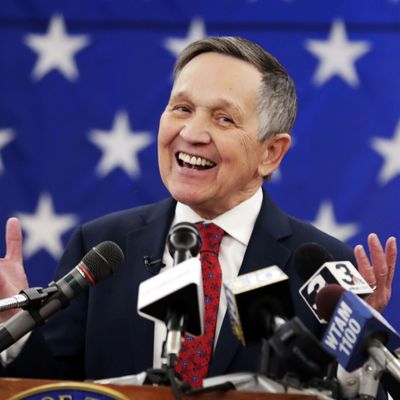
Newly announced Ohio gubernatorial candidate Dennis Kucinich made his first run for public office more than a half-century ago, when he was a student at Cleveland State University. By my unofficial count, he ran six times for various offices before being elected mayor of Cleveland in 1977. Two years later the “Boy Mayor” was denied reelection after being blamed (unfairly) for a municipal bankruptcy.
Both transcending and feeding off this notoriety, Kucinich’s long slog up and down the comeback trail led him through a self-exile on the West Coast, where he crashed for a while at the home of his longtime friend the actress Shirley MacLaine (at which site he famously glimpsed a UFO), and experienced near-personal-bankruptcy before returning to Ohio just in time to lose a Democratic primary for secretary of State in 1982 to a young fellow named Sherrod Brown (now the distinguished junior senator from the state). A year later he returned to the Cleveland City Council via a special election, then briefly ran for governor before dropping out and spending a number of years in New Mexico on a “quest for meaning.” In 1996 he returned to Ohio to win election to the State Senate, and then two years later won election to Congress. Thus ensued the longest period of stability in Kucinich’s adult life (or maybe his entire life; his family reportedly moved 21 times during his childhood), as he remained in the House until 2013.
Kucinich did not, of course, settle into a staid role as a congressional back-bencher. He ran for president in both 2004 and 2008, running campaigns known for their eccentricity (he was prone to break into song in his campaign appearances) as much as his left-bent policy pronouncements (relentlessly attacking moderate Democrats’ allegedly pro-corporate and pro-Pentagon policies). The fusion of his quirkiness and “populism” was probably best expressed by his spinning-top demonstration in countless appearances that he was the rare politician with “no strings”:
His presidential campaigns did not amount to much other than attracting a small but devoted following and a lot of gentle mockery. But he sojourned on until a GOP gerrymander tossed him into a 2012 reelection fight with fellow Democratic House member Marcy Kaptur, who sent Kucinich back into political exile.
From there the Kucinich saga took one of its oddest turns: He immediately became a Fox News contributor, signing on initially as a contributor to Bill O’Reilly’s show and then other network offerings. His eccentric stylings (featuring, in particular, steady criticism of the Obama administration’s hostility to Bashar al-Assad’s Syrian regime) turned more sinister as Donald Trump began his climb toward the presidency, with the former lefty gadfly often expressing agreement with the mogul’s anti-globalist rhetoric. After Trump took office, Kucinich frequently echoed Fox lines of defense for the 45th president, as The New Republic recently recalled in a warning to Ohio Democrats:
In May, Sean Hannity brought Kucinich on his show and announced that the former congressman was “making major news.” Kucinich then proceeded to warn that “our country itself is under attack from within.” “You have a politicization of the agencies that is resulting in leaks from anonymous, unknown people,” he said, “and the intention is to take down a president. This is very dangerous to America. It’s a threat to our republic. It constitutes a clear and present danger to our way of life.” “You’re saying President Trump is under attack by the deep state intelligence community?” Hannity later asked. “I believe that,” Kucinich said.
Presumably the UFO sighter had no problem believing the “deep state” conspiracy theory. And now that he’s running for governor of Ohio, as a Democrat yet again, Kucinich claims an affinity with Trump voters who might trust him over other Democrats:
I don’t know if there is another Democrat in Ohio who could run for office and do, is that I can reach out to the people who voted for President Trump. I can show them that there are Democrats who stand solidly for economic progress, who want to protect our markets, who want to stand up for everyday Americans. So, you know, to me, that’s my constituency, too. And I’m reaching out, and I’m not going to leave anyone out of picture.”
Trouble is, he made that claim on Fox & Friends, not the best platform for reaching voters who will participate in Ohio’s Democratic primary this year.
But Kucinich does have a workable strategy. The primary is very soon, in May. He has massive, if not always positive, name ID. He faces a field led by former Consumer Financial Protection Bureau director Richard Cordray, but also including State Supreme Court Justice Bill O’Neill, State Senator Joe Schiavoni and former state legislator Connie Pillich. In a state with no primary runoffs, Kucinich could win the nomination with a plurality, and his choice of Akron city council member Tara Samples indicates he’s running as the regional favorite of northeast Ohio. An early poll shows him running a relatively close second to Cordray on the strength of support from his home turf. With luck, and likely a sustained negative focus on the front-runner from candidates in both parties, Kucinich could pull out a primary win.
He’d then likely go on to get drubbed by Republican front-runner Mike DeWine. But defeat has never slowed down Kucinich before. So long as he’s willing to play the “populist” game on terms acceptable to Fox News, he’ll probably be welcome back there, and if all else fails, there’s always another campaign to wage.






























